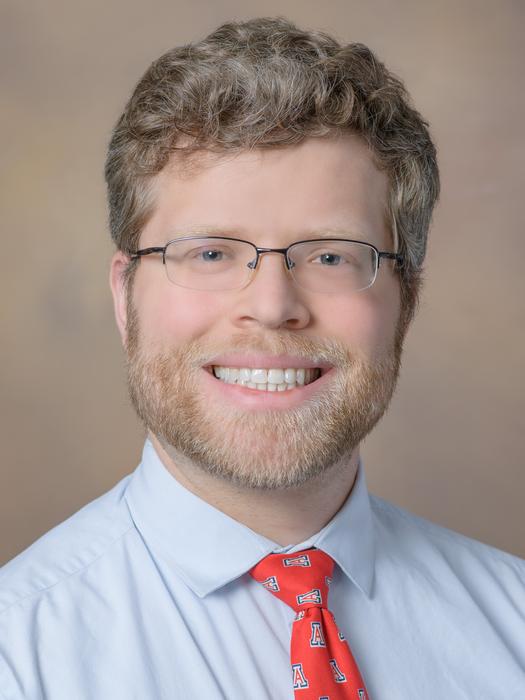An analysis by researchers in the Department of Psychiatry at the University of Arizona College of Medicine – Tucson showed that risks for death by suicide and homicide peak at night, with nocturnal wakefulness, age, alcohol use and relationship conflicts being especially prevalent as contributing factors.

Credit: University of Arizona College of Medicine – Tucson
An analysis by researchers in the Department of Psychiatry at the University of Arizona College of Medicine – Tucson showed that risks for death by suicide and homicide peak at night, with nocturnal wakefulness, age, alcohol use and relationship conflicts being especially prevalent as contributing factors.
Nearly 19% of suicides and 36% of homicides occur at night. Suicide and homicide share little in common, but their highly concordant overnight risk patterns suggest a common feature: nocturnal wakefulness.
“Disrupted sleep may acutely impair rational thought, which can drive impulsive behaviors in vulnerable individuals,” said first author Andrew Tubbs, MD, PhD, a researcher in the Sleep and Health Research Program at the UArizona College of Medicine – Tucson’s Department of Psychiatry. “Our analysis of 15 years of data across the U.S. showed that there is a five-fold greater risk for suicide and an eight-fold greater risk for homicide between 2 a.m. and 3 a.m. when adjusting for the number of people who are awake and capable of suicide or homicide.”
The paper, “Risk for Suicide and Homicide Peaks at Night: Findings From the National Violent Death Reporting System, 35 States, 2003–2017,” was published May 29 in Journal of Clinical Psychiatry.
“The fact that these overnight risk patterns apply to both suicide and homicide are striking,” said the study’s senior author Michael Grandner, PhD, an associate professor of psychiatry, director of the Behavioral Sleep Medicine Clinic and a BIO5 Institute member. “In our review of more than 78,000 suicides and 50,000 homicides, we can find some insight into why nocturnal wakefulness – what we are calling ‘the mind after midnight’ – carries a distinct risk for dysregulated behaviors.”
The authors’ mind after midnight hypothesis proposes that nocturnal wakefulness deteriorates the brain’s complex decision-making functions and reduces rational thinking during a time when negative mood is at its peak, positive mood is at its lowest, and risk/reward processing is distorted.
The findings supported that hypothesis. Nighttime risk was greater among adolescents and young adults, people who were intoxicated with alcohol, and those experiencing current partner conflict, conflict, but not among those who used cannabis or were currently
depressed.
Individuals aged 15-24 years experienced a three-fold greater nighttime risk for suicide, while there was an unexpected suicide risk among older adults at 6 a.m. Risk for homicide did not vary by age, though young adults accounted for more than half of all homicide victims.
“Few studies have examined time-of-day trends in violent crime,” Tubbs said. “Future studies could clarify what exactly is happening in the brain to predispose people to these sorts of risks and whether evidence-based strategies to improve sleep and reduce nighttime wakefulness can help reduce the risks and prevent these tragic outcomes.”
Journal
Journal of Clinical Psychiatry
Method of Research
Data/statistical analysis
Subject of Research
Not applicable
Article Title
Risk for Suicide and Homicide Peaks at Night: Findings From the National Violent Death Reporting System, 35 States, 2003–2017
Article Publication Date
29-May-2024
COI Statement
In the past 2 years, Dr Tubbs reports fees from the American Academy of Sleep Medicine and the American Council of Life Insurers. Dr
Klerman reports consulting for the American Academy of Sleep Medicine Foundation, Circadian Therapeutics, National Sleep Foundation, Sleep Research Society Foundation, and Yale University Press; receives travel support from the European Biological Rhythms Society, EPFL Pavilions, and World Sleep Society; and serves on Scientific Advisory Board (unpaid) for Chronsulting. Her partner is the founder, director,
and chief scientific officer of Chronsulting. Dr Karp receives grant support from Janssen. He has the potential for equity in Aifred Health for scientific advising. He has served as a scientific advisor to Biogen. He receives remuneration from the Journal of Clinical Psychiatry and the American Journal of Geriatric Psychiatry for service on the editorial boards. Dr Chakravorty reports research support from the NSF and
NeuroFlow Inc. Dr Perlis reports research support from Axsome, grant support from NIH, and consulting income from Nexalin, Anavex, and Avecho and that he has participated in CE/CME and is a founding partner in Hypknowledge LLC. Dr Grandner reports consulting fees from Idorsia, Eisai, Jazz Pharmaceuticals, Merck, Fitbit, Natrol, SmartyPants Vitamins, Athleta, National Sleep Foundation, American Sleep Medicine Foundation, and Canyon Ranch; received grants from NIH, Kemin Foods, Jazz Pharmaceuticals, and CeraZ; received publishing royalties from Elsevier; and received speaking honoraria and/or travel support from New York University, University of Maryland, Stavis & Cohen, University of Miami, Clinical Education Alliance, and Jazz Pharmaceuticals. Drs Fernandez and Basner and Ms Watkins have no disclosures.



